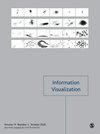ClustML:从人类标记的分组中学习散点图中聚类模式复杂性的测量方法
IF 1.8
4区 计算机科学
Q3 COMPUTER SCIENCE, SOFTWARE ENGINEERING
引用次数: 0
摘要
视觉质量度量(VQM)旨在通过自动检测和量化可视化中的模式为分析人员提供支持。我们针对散点图中的视觉分组模式提出了一种新的 VQM,称为 ClustML,它是根据以前收集的人类主体判断训练而成的。我们的模型在高斯混合模型的参数空间中对散点图进行编码,并使用根据人类判断数据训练的分类器来估计分组模式的感知复杂度。初始混合物成分和最终组合组的数量可量化散点图中的视觉分组模式。首先,它能更好地估计人类对双高斯聚类模式的判断;其次,在对散点图中的一般聚类模式进行排序时,它能提供更高的准确性,从而改进了现有的 VQM。我们用它来分析全基因组关联研究的亲缘关系数据,在这种研究中,专家依赖于对大量散点图集的可视化分析。我们将提供基准数据集和新的 VQM,以供实际使用和进一步改进。本文章由计算机程序翻译,如有差异,请以英文原文为准。
ClustML: A measure of cluster pattern complexity in scatterplots learnt from human-labeled groupings
Visual quality measures (VQMs) are designed to support analysts by automatically detecting and quantifying patterns in visualizations. We propose a new VQM for visual grouping patterns in scatterplots, called ClustML, which is trained on previously collected human subject judgments. Our model encodes scatterplots in the parametric space of a Gaussian Mixture Model and uses a classifier trained on human judgment data to estimate the perceptual complexity of grouping patterns. The numbers of initial mixture components and final combined groups quantify visual cluster patterns in scatterplots. It improves on existing VQMs, first, by better estimating human judgments on two-Gaussian cluster patterns and, second, by giving higher accuracy when ranking general cluster patterns in scatterplots. We use it to analyze kinship data for genome-wide association studies, in which experts rely on the visual analysis of large sets of scatterplots. We make the benchmark datasets and the new VQM available for practical use and further improvements.
求助全文
通过发布文献求助,成功后即可免费获取论文全文。
去求助
来源期刊

Information Visualization
COMPUTER SCIENCE, SOFTWARE ENGINEERING-
CiteScore
5.40
自引率
0.00%
发文量
16
审稿时长
>12 weeks
期刊介绍:
Information Visualization is essential reading for researchers and practitioners of information visualization and is of interest to computer scientists and data analysts working on related specialisms. This journal is an international, peer-reviewed journal publishing articles on fundamental research and applications of information visualization. The journal acts as a dedicated forum for the theories, methodologies, techniques and evaluations of information visualization and its applications.
The journal is a core vehicle for developing a generic research agenda for the field by identifying and developing the unique and significant aspects of information visualization. Emphasis is placed on interdisciplinary material and on the close connection between theory and practice.
This journal is a member of the Committee on Publication Ethics (COPE).
 求助内容:
求助内容: 应助结果提醒方式:
应助结果提醒方式:


